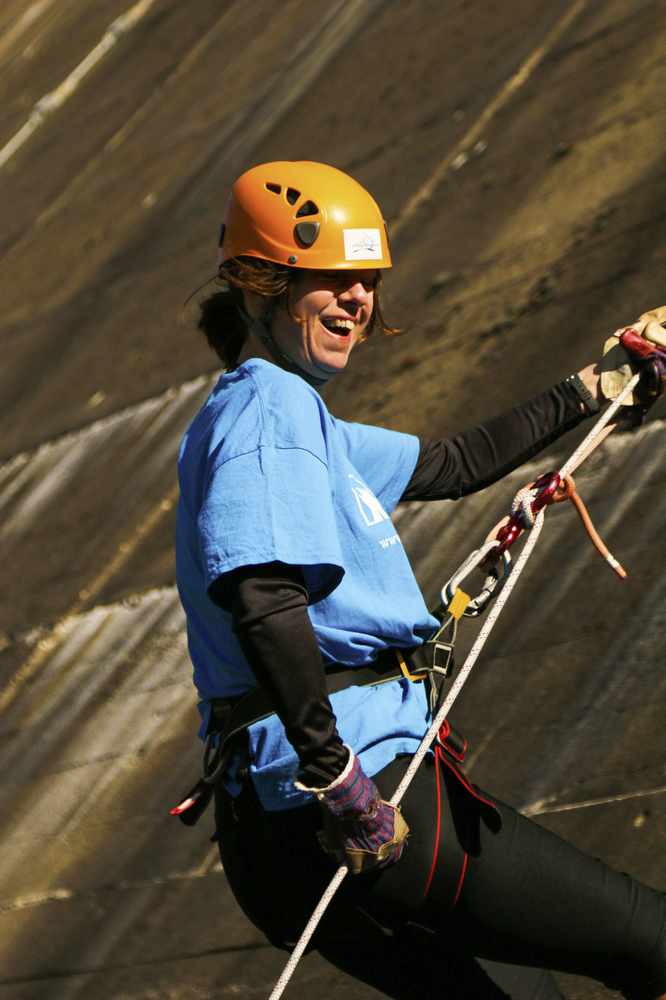- Interview with Linda Scott, who says taking up an abseiling challenge for Autism Jersey was nothing compared to the difficulties her autistic son Cameron faces on a daily basis
- Find out more about the condition below
- See how you can get involved with raising money for Autism Jersey
WHEN Linda Scott prepared to abseil down the high castle wall at Mont Orgueil last year, all she could think of was how scared her autistic son could be just coping with everyday life.
‘I just thought how terrified Cameron can be, and I kept that in my head,’ she said. ‘Abseiling made me appreciate what life can be like for him.’
Being the mother of a severely autistic child is tough, she admits, and something that she had to come to terms with.
And more recently she has had to come to terms with the fact that, in June last year, her son moved out of the family home – several years earlier than she anticipated.
- Autism is a very complicated condition. It affects how a person communicates, interacts and understands the world around them.
- Autism is a life-long developmental disability. There is no cure, but a range of interventions is available throughout childhood and as an adult.
- It is a spectrum condition, which means that, while all people with autism share certain difficulties, their condition will affect them in different ways.
- Some people with autism are able to live relatively independent lives, but others may have accompanying learning disabilities and need a lifetime of specialist support.
- People with autism may also experience over- or under-sensitivity to sounds, touch, tastes, smells, light or colours.
- Four times as many boys as girls are diagnosed with autism.
- The number of diagnosed cases of autism has increased during the past 20 years, reportedly because of more accurate diagnoses.
Cameron is the first individual to be supported 24 hours a day by Autism Jersey.
He has two full-time carers who live with him in a bungalow in the west of the Island.
Cameron, who was diagnosed at the age of two, is non-verbal, has considerable sensory issues and severe learning difficulties.
He can prepare food and go to the toilet independently, and he can get dressed and wash himself.
But his biggest day-to-day issue would seem to be sensory issues – and they got much worse when he hit puberty.
‘Even in the house we could no longer speak to each other – the noise of us speaking would raise his anxiety levels,’ Linda said.
‘Even my breathing could be too loud for him. Anxiety would make him distressed and unpredictable.’
The family had their challenges with Cameron, but they felt they could cope – they could manage outings to the beach or the zoo, even a holiday.
‘It was all focused on what Cameron could cope with at the time, but it was a relatively normal family life,’ Linda said.
‘But that changed when he was 13 or 14.’
He had sensory issues already, but they got worse and the family felt like they had been treading on eggshells around him for a while. It came to a head one evening when his emotions were running very high.
‘The slightest little thing was raising his anxiety levels,’ she said.
‘The next day someone at school referred to him coming home afterwards and I just remember thinking, no.
‘I realised that no matter what we did, it wasn’t making a difference to him.
‘It was not about how things were for us, but how things were for him.
‘The move had to happen. We had done everything we had been advised to do. Now, Cameron has the structure and support he needs that he couldn’t get in the family home.
‘He has good days and bad. I see him three or four times a week and it’s lovely on good days to see him smiling and happy. At other times, just seeing a dog off a lead can turn a good day into a bad day.’
Cameron stopped signing as a way to communicate, and on some days he wouldn’t get dressed. ‘The smallest things we take for granted became a problem,’ she said.
Since she is no longer Cameron’s carer, Linda has returned to work full-time and, she says, home life is calmer.
Cameron has a twin brother, James, who is currently completing a sports diploma at Highlands College.
‘Home life for James has got much better,’ she said. ‘Touch wood, he has not been affected too much. He is a very resilient young man, if anything. He knows that Cameron is being looked after and he doesn’t have to worry.’
Cameron still attends the Mont à l’Abbé provision at Haute Vallée, but that will end this summer.
‘He’s not in the classroom but he has a very individualised programme and Autism Jersey staff have observed him in school so that they can transfer some of the activities to the home environment,’ Linda said.
His carers follow a programme knowing what Cameron likes – walking, listening to music and puzzles – and they will soon reintroduce swimming.

The key to making Cameron’s life comfortable is the understanding of staff who have to react to his needs on a daily basis.
And it is the word ‘understanding’ that Linda uses when asked what she would like to get across in this month of autism awareness. She uses dog walkers as an example.
Cameron often walks around Val de la Mare reservoir, where dogs are supposed to be on the lead.
She said it does not matter if an owner considers their pet to be well behaved, that is no use to Cameron, who is absolutely terrified.
‘It’s the classic child in the supermarket moment, isn’t it? I always thought I could cope in public with Cameron’s funny ways – but it was the attitude of other people I found difficult to deal with,’ she said.
Linda still gets emotional when speaking about Cameron and his move to his new home.
‘I am confident in his care, I know he is in the right place and it was the right thing to do, but it doesn’t mean to say that it’s easy,’ she said.
‘It’s really hard being a parent of an autistic child, but my role now is to be a part-time hands-on mum who is there to advocate for him.
‘Home is calmer, but Cameron is always there in my head, and there are always meetings to attend to discuss his needs.’
Carl Le Poidevin, acting services manager for Autism Jersey, said that there were a number of other young people who would benefit from the kind of support that Cameron receives, which is delivered by the charity but funded by the States.
ISLANDERS are encouraged to ‘do something awesome for autism’ during April. Tomorrow there is a sponsored walk from Le Braye Café to L’Etacq and back. Walkers are asked to make a minimum donation of £5 and they will receive a discount at Le Braye Café on their return. Dogs are welcome.
Even if you are not taking part in the walk, you are invited to join Autism Jersey for a photo on the beach at Le Braye at 9.45 am. The aim is to get 1,000 people for the photo, representing the number of people in Jersey with autism.
For fundraising ideas and events, click here
‘Personalised support of this nature is, I believe, the best way to facilitate support for individuals with autism and a high level of need, enabling them to live active and inclusive lives in the community,’ said Carl.
Linda said you do have to come to terms with having an autistic child. ‘You want your twin boys to grow up and be the best of buddies, but you can’t change these things and you have to make the most of what you can.
‘As a parent, you want your children to be happy, which touch wood I think they are.
‘I don’t think that would be the case if Cameron was still at home.’
Linda, who has supported the work of Autism Jersey for many years, has taken part in major fundraising challenges like trekking up Mount Kilimanjaro and in the foothills of the Pyrenees.
Support from others in the same situation is crucial, she says, and she has got through some tough times with friends from Autism Jersey.
‘You have to support each other. Laugh, moan, cry – and then get on with it.’






